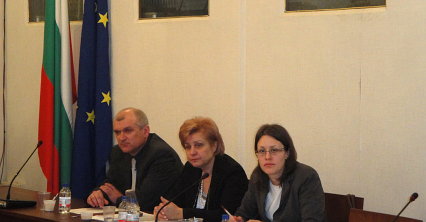
The national representatives have not supported the introduction, proposed by the European Commission, of two new taxes. At a joint meeting, deputies from the parliamentary Committee on European Affairs and Oversight of European Funds and the Budget and Finance Committee discussed the package of legislative initiatives proposed by the European Commission for the new Multiannual Financial Framework for the 2014-2020 period. The topic is included in the Annual Working Programme on EU Affairs of the National Assembly.
The report prepared by the two committees was discussed in the presence of representatives of the executive branch of power, the non-governmental sector and the business. The stand of the Bulgarian government with respect to the EC legislative package was presented by the deputy finance minister Ms Boryana Pencheva. Active participants in the debate concerning the EU Multiannual financial framework for the 2014-2020 period were the senior economist of the “Open Society” Institute Georgi Angelov, Desislava Nikolova – chief economist of the Institute for Market Economy and Kamen Kolev – vice-president of the Bulgarian Business Chamber.
Both parliamentary committees’ members praised the EU Multiannual financial framework as a good financial instrument, tuned to the objectives of
Deputies discussed in details the MFF policies of key importance to
They underscored that the policy aimed at rapprochement should be allocated more funds for the development of basic infrastructure.
In compliance with the larger authority given to the national parliaments by the Lisbon Treaty giving them power to participate in the earliest stages of the EU decision making process, the two committees expressed their stand on the income part of the proposed MFF. They shared the opinion that the proposed reform of the EU tax system by introducing a new levy on financial transactions and a European VAT would lead to an additional tax burden for the citizens and the business in
This position of the Bulgarian parliament will be presented and discussed with the European Commission and the European Parliament.

- 22/04/2021
The Parliament imposed a moratorium on concessions, real estate deals and appointments pending the election of a new cabinet or caretaker government - 16/04/2021
By 156 votes “in favour”, the National Assembly accepted the resignation of the Council of Ministers with Prime Minister Boyko Borisov - 15/04/2021
Speech by Mrs. Iva Miteva upon her election as a President of the 45th National Assembly - 15/04/2021
The Member of Parliament Iva Miteva was elected President of the 45th National Assembly - 15/04/2021
The Members of the 45th National Assembly were officially sworn in - 03/03/2021
The President of the National Assembly Tsveta Karayancheva and MPs attended the solemn fireworks-retreat on the occasion of the Liberation of Bulgaria - 03/03/2021
Every Bulgarian should preserve and honour the memory of those glorious ancestors, thanks to whom Bulgaria exists today, said the President of the National Assembly Tsveta Karayancheva in Gabrovo - 03/03/2021
Today we are on Shipka to pay our respects to all the heroes who sacrificed their lives for freedom, said the President of the National Assembly Tsveta Karayancheva after climbing Shipka Peak together with young people from all over the country - 02/03/2021
The Vice-President of the National Assembly Valeri Simeonov received an award from the Bulgarian Republican Self-Government in Hungary - 26/02/2021
The Parliament adopted at second reading amendments to the Measures Against Money Laundering Act
 Български
Български English
English